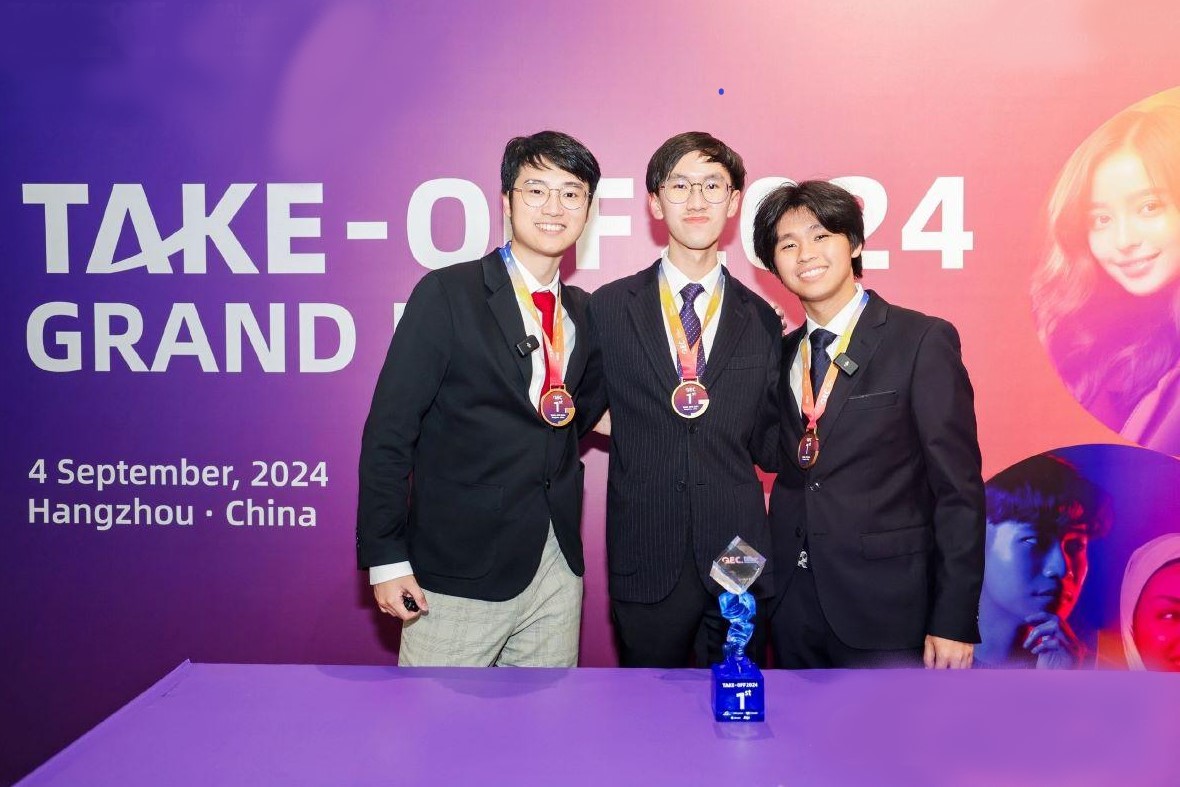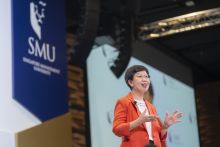SMU's AI innovators dominate at Alibaba international hackathon

In a remarkable display of innovation and technical prowess, three second-year Computer Science students from SMU clinched the top prize at the prestigious Alibaba International Global E-Commerce Challenge, held at Alibaba’s headquarters in Hangzhou on 4 September.
Their scalable and automated AI solution, AliAdapt, has the potential to save online platforms like AliExpress significant sums in fines by identifying non-compliant products.
The team comprises Joel Lim Jing Kai, Vince Tan Yueh Yang and Zane Chee Jun Yi, all second-year Bachelor of Science in Computer Systems students. SCIS Dean Professor Pang Hwee Hwa called their victory “a testament to the fact that our Computer Science students are not just adept with the computing concepts but also attuned to the business needs of companies”.
“Their creativity reinforces the value of the education and real-world experiences that we offer at SCIS and SMU in preparing our students to make meaningful impact wherever they go,” he added. “With the increased competition for tech jobs and internships, I am glad to see that our school culture encourages students to take the extra step to differentiate themselves.”
Even though the trio are just in Year 2, they are passionate about the use of Machine Learning (ML) to solve real-world problems.
They actively searched for AI and ML hackathons which could offer a springboard for postgraduate studies or ML engineering jobs in the future. “Alibaba's problem statement was the most interesting, and the competition is a very prestigious one, so we decided to spend our time on it,” said Joel.
The second prize went to a team from Johns Hopkins University and the University of Maryland, College Park from the United States, while the third place went to a team fielded by Bandung Institute of Technology of Indonesia.
There were 11 teams beside the SMU trio in the finals, including one from the National University of Singapore (NUS), one from Nanyang Technological University and one that had an NUS student partnered with a Singapore Institute of Technology student.
These 11 teams had been narrowed down from 500 teams comprising over 1,100 participants from Europe, the Americas, East Asia and Southeast Asia.
AliAdapt – an automated and cost-effective AI-based solution
Christened AliAdapt, the solution by the trio is an integrated system of three machine learning components that can automate the verification process for exporting product listings to different countries.
“For example, if a Singapore-based e-commerce business owner wishes to sell his thermal flask in China, our AI models can automatically classify his thermal flask product listing as exportable or not exportable into China,” said Joel.
“If his product is exportable, the business owner receives a verification checkmark that allows him to expand into the Chinese market,” he elaborated.
If the product is not exportable into the target country, AliAdapt continues to help the retailer out with obtaining the necessary permits to sell their product in the foreign country – a process which is normally difficult for e-commerce business owners to navigate by themselves.
“Our solution also includes a dashboard that allows sellers on e-commerce platforms to easily get verified, and also enables them to track all of their product listings, as well as the countries they’re able to be sold in,” Joel continues.
“AliAdapt is designed to be scalable and cost-effective to adapt to the constantly changing regulatory environment.”
Dreams for the future
Joel, Vince, and Zane have also received the SMU Global Impact Scholarship, which seeks to develop action leaders with a global perspective for the public, private and people sectors. The trio are involved in the SMU Business Intelligence and Analytics (SMUBIA) club and won US$10,000 in travel vouchers. As finalists, they will also be given Alibaba International internship opportunities.
Joel is the head of SMUBIA’s 10th Data Associates Programme (DAP). All three participated in the DAP in Year 1, which gave them a strong grounding in Machine Learning – something that empowered them to take part in the competition.
“We love to build working prototypes that have real-world impact. We saw an opportunity to make a global impact with this competition, so we signed up for it,” Joel shared.
“Competing against such talented teams pushed us to think creatively. The internship will be a great opportunity to work with some of the brightest minds in the industry,” said Vince. “We hope we can contribute to projects that have a real impact.”
With their innovation mindset and the support of SMU, Joel, Vince, and Zane are poised to make significant contributions to the field of AI and e-commerce
See also: SMU students win big at Alibaba International hackathon on Alibaba home ground | SMU Newsroom


